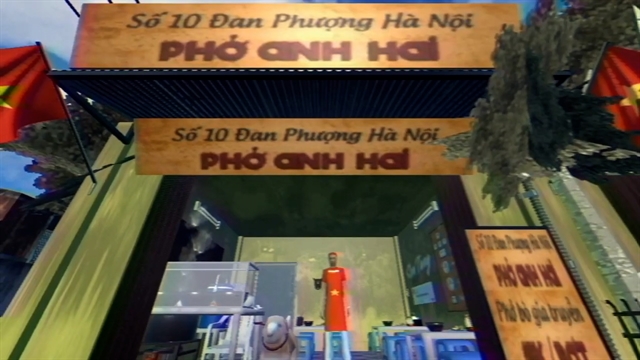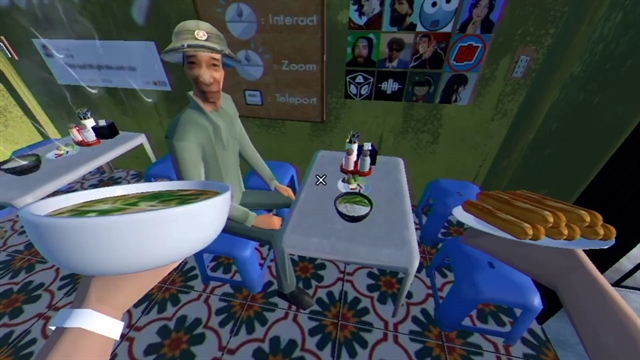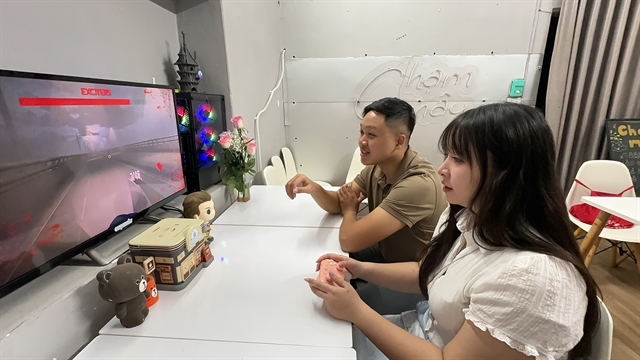 Society
Society

By Lê Hương
A virtual phở restaurant has recently taken the gaming community by storm.
'Brother Hai's Phở Restaurant' is an indie game developed by a 22-year-old student from Hà Nội University of Science and Technology, who prefers to remain anonymous. Players take on the role of Brother Hai, who runs a phở shop at 10 Đan Phượng Street in a peaceful suburban village outside the capital.
Players not only serve bowls of phở as ordered, but also navigate amusing and unexpected challenges, such as protecting Brother Hai’s pet dog, named Golden Boy, from being stolen.
“This game reflects many of today’s youth trends,” player Lê Thị Thủy Tiên told Việt Nam News. “It brings the image of Vietnamese phở to the public through a creative and engaging storyline.”

|
| Brother Hai's phở restaurant in the game looks like a typical street corner restaurant in Hà Nội. Photo from the game |
Player Triệu Lê Việt Bảo noted that for foreign gamers, the retro-style graphics and the unfamiliar cultural setting make it especially intriguing.
“The events unfold in places many foreign players may not even know about, which gives the game its unique charm,” he said.
To player Nguyễn Nam Phong, the game’s branching storyline, with multiple paths and hidden endings, is a key attraction. He believes that even weeks after launch, the gaming community has yet to uncover all of its mysteries.

|
| Players have to serve customers. Photo from the game |
What sets 'Brother Hai's Phở Restaurant' apart is not flashy effects or advanced graphics, but its deeply Vietnamese setting.
“The most distinctive detail is the bowl of phở itself,” Tiên said. “It doesn’t represent any single region. The game includes beef balls, a southern signature ingredient, and even leftover rice served with phở, reminiscent of meals from the subsidy era. Through that, it teaches young players the story and long history of this iconic dish.”
Phong added that the game’s cultural elements are what helped it go viral.
“From tiny details to full story arcs, everything ties into humorous cultural themes popular on Vietnamese social media,” he said.
However, Bảo noted that compared to foreign titles, the game still has room for improvement.
“The content should be richer and more substantial to keep players engaged longer,” he said.

|
| The game has quickly won the hearts of young players. VNS Photo Lê Hương |
Despite this minor shortcoming, the offline game has been downloaded over a million times, a promising sign for those hoping to promote Vietnamese culture through gaming.
Spreading culture
“Incorporating cultural elements is a great approach,” Tiên said. “It has helped me learn a lot about both Vietnamese and global history and culture. I’ve played several games with historical or cultural themes, and they were all fascinating.”
Bảo agreed that online games can effectively spread culture.
“The key is a strong storyline that delivers those cultural elements,” he stressed. “This is especially important for online players, who value connection.”

|
| Engineers work at LacBird Corporation. VNS Photo Lê Hương |
LacBird Corporation, a multinational technology start-up, is among the pioneers producing games designed to promote Vietnamese culture.
“We incorporate historical settings, traditional costumes, tools and mythological themes,” said company COO Trần Mạnh Tùng. “Players encounter legendary figures like Sơn Tinh and Thủy Tinh, along with mythical creatures such as the golden turtle, dragons and phoenixes.”
The corporation has developed four projects, including 'Lạc Việt Phiêu Liêu Ký' (Lac Viet Adventures) and 'Thục Ma Ngự Sử' (Tale of Exorcist).
“Games are not just games,” Tùng said. “They are journeys through Vietnamese culture.”
According to him, online games are among the fastest and most effective ways to spread Vietnamese culture.
“They don’t just tell stories. Players experience them firsthand through their own emotions. It’s normal for a single game to reach millions of people worldwide.”
Tùng added that promoting Vietnamese culture remains a core value in the company’s development strategy.
“That’s why all our games carry a strong imprint of national cultural identity,” he said. VNS




